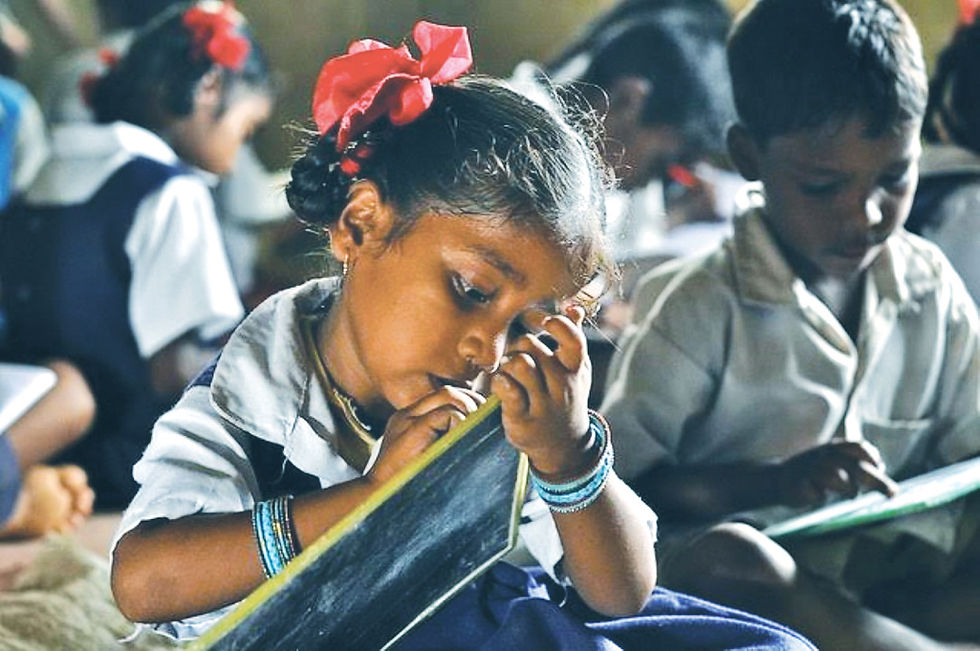India’s Schooling Safari
- Ruddhi Phadke

- Jul 19, 2025
- 3 min read
In India’s crowded education marketplace, choosing your child’s school is as much about faith as foresight.

My son was just eight months old when we began looking for schools. It felt premature, but we didn’t want to be caught unprepared. We procrastinated for six more months, only to find we had already missed application deadlines for two of Mumbai’s most sought-after schools. It turns out many schools offer a continuous education from playgroup through grade 12, and if you don’t get in early, the door may close forever.
By the time he was 18 months old, we were scrambling. It wasn’t just about choosing the ‘right’ school anymore. We were also being asked to choose the ‘right’ board—CBSE, ICSE, IB, IGCSE, NIOS or the state board. Each implied a future we hadn’t even begun to imagine for our child. Therein lay the rub. How were we supposed to pick a board today, based on who he might become a decade later?
In my childhood, the only criterion my parents used was proximity. “The school nearest to our house,” was their reasoning. Convenience ruled. Now, we were navigating a sprawling and confusing system of competing educational philosophies, assessment systems and global alignments. Every board seemed to demand a kind of parental foresight no one truly has.
CBSE, we learned, was geared towards competitive exams, especially in science and mathematics. ICSE had a broader curriculum with stronger English-language skills. IB promised global exposure and flexibility, ideal for students aiming to study abroad. IGCSE offered structure and international recognition, while NIOS seemed tailored for independent or non-traditional learners. State boards, often dismissed, offered standardised books and more manageable academic pressure - perhaps underrated virtues.
Asawari Abhyankar, a teacher at an IB school in Mumbai, praises IB for offering a wide subject range early on, promoting global citizenship and student-centred learning. “There’s no pressure,” she says. “No board exams till grade 12. Community service is part of the curriculum. It is age-appropriate and holistic.” It sounds ideal only if you had the right teachers. But that was another concern: the quality of teaching varied wildly between schools, and IB’s autonomy made it even more dependent on well-trained educators.
Manasi Joshi, a practising psychologist and counsellor at Nair Hospital, sends her children to a school that follows the Waldorf system. Based on the educational philosophy of Rudolf Steiner, it sounded like a world apart. “This system isn’t about preparing children for medical or engineering entrance tests,” she says. “It’s about raising independent human beings.” Her children didn’t hold a pencil until grade two. Reading and writing began only at age seven. There were no screens, no pressure, no early academic milestones. Instead, they learn by doing—sowing rice, harvesting it, cooking meals, cleaning up after themselves. Geography was taught on the farm, not in the textbook.
It was revolutionary but also daunting. Joshi admitted that many relatives were horrified that her daughter couldn’t write a word until grade two. “But she’s happy,” Joshi insisted. “She loves school. And that, to me, is success.”
Still, we wondered: what happens after class 12, when all these children from different boards are thrown into the same competitive arena? Joshi acknowledges the tension. “Life skills-wise, they are much better prepared. But they may take time to catch up with the exam rat race.” Her view is that childhood should not be sacrificed for a future that hasn’t arrived yet. “If my daughter is meant to be a doctor, she’ll become one regardless of what she was doing at four.”
Radnyee Naik, a Pune-based language trainer and co-founder of LinguBee Educations, moved her son across three boards—IB, then IGCSE, and finally CBSE. “IB is brilliant conceptually but it depends too much on teacher quality. IGCSE had better structure, but ultimately, I had to face reality.” In India, marks still matter. Competitive exams decide your future. So, she returned to CBSE out of necessity.
Many educationists we spoke to believe that state boards (often dismissed as outdated) may actually be the most age-appropriate. They offer just enough rigour, are easier for parents to monitor, and place less psychological burden on children. Simplicity, it seems, still has value.
In the end, every board claims to offer something different. But the real question may not be which board is best but how much faith parents have in the path they choose. I have come to believe that children, when given space to think independently, will eventually gravitate towards what they are meant to do. Our job is not to forecast their destiny at 18 months old but give them the freedom to explore it when they’re ready.





Comments